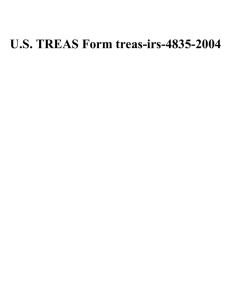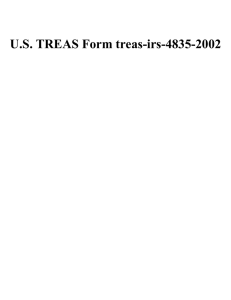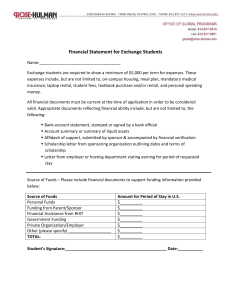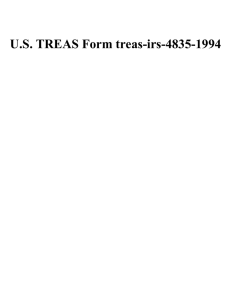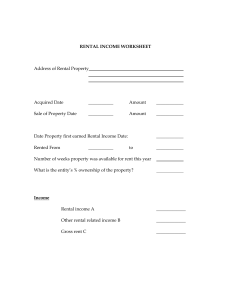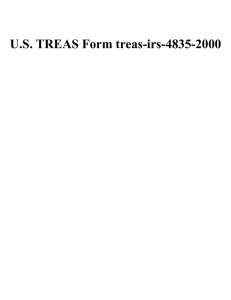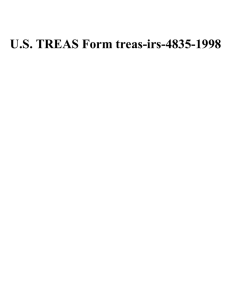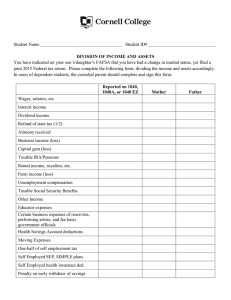U.S. TREAS Form treas-irs-4835-1992
advertisement
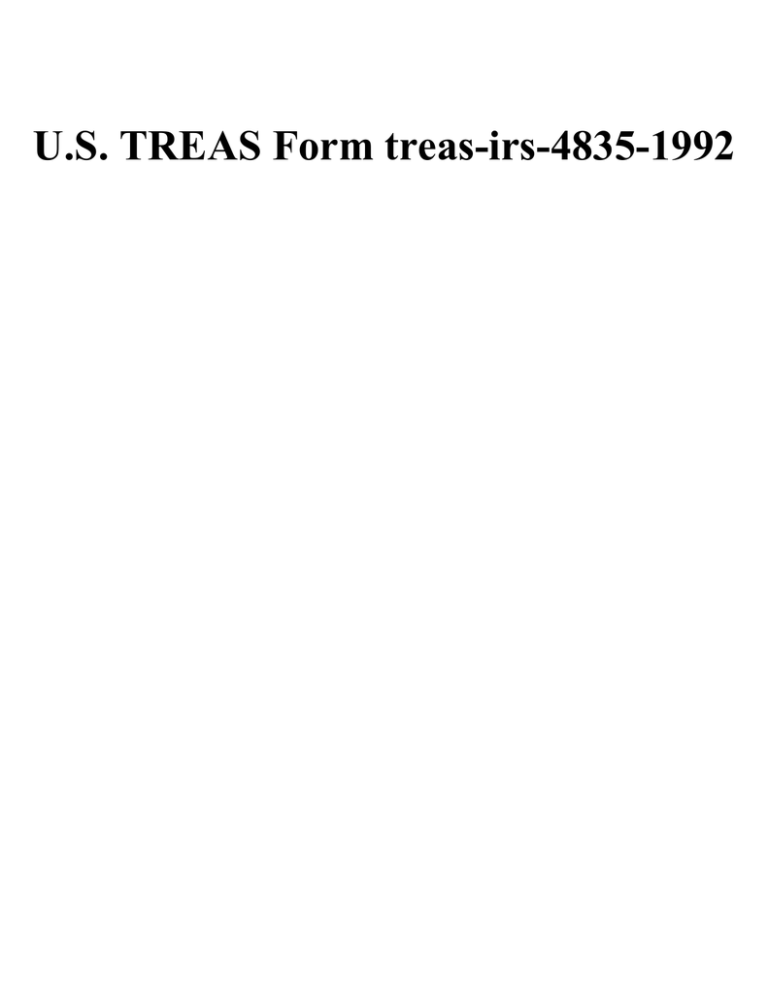
U.S. TREAS Form treas-irs-4835-1992 Form 4835 OMB No. 1545-0187 Farm Rental Income and Expenses (Crop and Livestock Shares (Not Cash) Received by Landowner (or Sub-Lessor)) (Income not subject to self-employment tax) Department of the Treasury Internal Revenue Service � Attach to Form 1040. � Attachment Sequence No. See instructions on back. Name(s) shown on Form 1040 37 Your social security number Employer ID number (Not SSN) A Did you actively participate in the operation of this farm during 1992? See instructions Part I 1 2a 3a 4 a b 5 a c 6 7 9 10 11 12 No Gross Farm Rental Income—Based on Production. Include amounts converted to cash or the equivalent. Income from production of livestock, produce, grains, and other crops Total cooperative distributions (Form(s) 1099-PATR) 2a Agricultural program payments. See instructions 3a Commodity Credit Corporation (CCC) loans. See instructions. CCC loans reported under election CCC loans forfeited or repaid with certificates 4b 2b Taxable amount 3b Taxable amount 4c Taxable amount Crop insurance proceeds and certain disaster payments. See instructions: 5a Amount received in 1992 5b Taxable amount If election to defer to 1993 is attached, check here � . 5d Amount deferred from 1991 Other income, including Federal and state gasoline or fuel tax credit or refund. See instructions Gross farm rents. Add amounts in the right column for lines 1 through 6. Enter the total here � and on Schedule E (Form 1040), line 41 Part II 8 Yes 1 2b 3b 4a 4c 5b 5d 6 7 Expenses—Farm Rental Property. Do not include personal or living expenses. Car and truck expenses (see Schedule F instructions—also attach Form 4562) Chemicals 8 9 Conservation expenses. Attach 10 Form 8645 11 Custom hire (machine work) Depreciation and section 179 expense deduction not claimed elsewhere Employee benefit programs other than on line 21. See Schedule F instructions 14 Feed purchased 15 Fertilizers and lime 16 Freight and trucking 17 Gasoline, fuel, and oil 18 Insurance (other than health) 19 Interest: a Mortgage (paid to banks, etc.) b Other 12 13 13 14 15 16 17 18 19a 19b 20 Labor hired (less jobs credit). See Schedule F instructions 21 Pension and profit-sharing plans 22 Rent or lease. See instructions: a Vehicles, machinery, and equipment b Other (land, animals, etc.) 23 Repairs and maintenance 24 Seeds and plants purchased 25 Storage and warehousing 26 Supplies purchased 27 Taxes 28 Utilities 29 Veterinary, breeding, and medicine 30 Other expenses (specify): a b c d e f g 20 21 22a 22b 23 24 25 26 27 28 29 30a 30b 30c 30d 30e 30f 30g 31 Total expenses. Add lines 8 through 30g � 31 32 Net farm rental income or (loss). Subtract line 31 from line 7. If the result is income, enter it here and on Schedule E, line 39. If the result is a loss, you MUST go on to line 33 32 33 If line 32 is a loss, you MUST check the box that describes your investment in this activity. See instructions 33a � 33b You may need to complete Form 8582 to determine your deductible loss, regardless of which box you check (see instructions). However, if you checked 33b, you MUST complete Form 6198 before going to Form 8582. In either case, enter the deductible loss here and on Schedule E, line 39 33c For Paperwork Reduction Act Notice, see instructions on back. Cat. No. 13117W All investment is at risk. Some investment is not at risk. Form 4835 (1992) Form 4835 (1992) Page General Instructions Paperwork Reduction Act Notice.—We ask for the information on this form to carry out the Internal Revenue laws of the United States. You are required to give us the information. We need it to ensure that you are complying with these laws and to allow us to figure and collect the right amount of tax. The time needed to complete and file this form will vary depending on individual circumstances. The estimated average time is: Recordkeeping 2 hr., 57 min. Learning about the law or the form Preparing the form 4 min. 1 hr., 2 min. Copying, assembling, and sending the form to the IRS Generally, you are considered to actively participate if you participated in making management decisions or arranging for others to provide services (such as repairs) in a significant and bona fide sense. Management decisions that are relevant in this context include approving new tenants, deciding on rental terms, approving capital or repair expenditures, and other similar decisions. You do not, however, actively participate if at any time during the year your interest (including your spouse’s interest in the activity) was less than 10% (by value) of all interests in the activity. If you actively participated, check the “Yes” box on line A. Part I—Gross Farm Rental Income—Based on Production 20 min. Line 1.—Report income you received from livestock, produce, grains, and other crops based on production. Include amounts converted to cash or the equivalent. If you have comments concerning the accuracy of these time estimates or suggestions for making this form more simple, we would be happy to hear from you. You can write to both the IRS and the Office of Management and Budget at the addresses listed in the Instructions for Form 1040. Note: Tenants must not use this form to report farm income and expenses. Individuals must use Schedule F (Form 1040). Purpose of form.—Use Form 4835 to report farm rental income based on crops or livestock produced by the tenant if you were the landowner (or sub-lessor), and you did not materially participate (for self-employment tax purposes) in the operation or management of the farm. Use this form only if the activity is a rental activity for purposes of the passive activity loss limitations. See the instructions for Form 8582, Passive Activity Loss Limitations, for the definition of “rental activity.” Under both the cash and the accrual methods of reporting, you must report livestock or crop share rentals received in the year you convert them into money or its equivalent. Landowners (or sub-lessors) must not use this form to report cash rent received for pasture or farmland if the amount is based on a flat charge. Report this income directly on Schedule E (Form 1040). Additional Information.—For more information, see the instructions for Schedule F and Pub. 225, Farmer’s Tax Guide. Specific Instructions Employer ID number.—You need an employer ID number (EIN) only if you had a Keogh plan or were required to file an employment, excise, or alcohol, tobacco, or firearms tax return. If you need an EIN, file Form SS-4, Application for Employer Identification Number. Line A.—Generally, you can deduct losses from passive activities only to the extent of income from passive activities. However, there are exceptions for certain activities, such as rental real estate activities. If you actively participated in the operation of this activity and you show a loss on line 32, you may be able to deduct up to $25,000 of losses from all rental real estate activities. Lower amounts apply if you are married filing separately. Lines 2a and 2b.—Enter on line 2a your total distributions from cooperatives as shown on Form 1099-PATR. On line 2b report the taxable amount. See the instructions for Schedule F, lines 5a and 5b, on page F-2. Lines 3a and 3b.—Enter on line 3a the TOTAL payments you received. On line 3b report only the taxable amount. See the instructions for Schedule F, lines 6a and 6b, on page F-2. 2 2. Expenses of producing any plant that has a preproductive period of 2 years or less, or 3. Expenses of replanting certain crops if they were lost or damaged by reason of freezing temperatures, disease, drought, pests, or casualty. But you may be able to currently deduct rather than capitalize the expenses of producing a plant with a preproductive period of more than 2 years. For more details on these rules, see the instructions for Schedule F, Part II, on page F-3. Do not reduce your expenses on lines 8–30f by the preproductive period expenses you must capitalize. Instead, enter the total amount capitalized in parentheses on line 30g. Reduce your total expenses by this amount before entering an amount on line 31. On the line to the left of the line 30g entry space, write “263A.” Line 10.—Expenses you paid or incurred for soil and water conservation may only be deducted if they are consistent with a plan approved by the Soil Conservation Service (SCS) of the Department of Agriculture for the area in which your land is located. If no plan exists, your expenses must be consistent with a soil conservation plan of a comparable state agency. You must attach Form 8645, Soil and Water Conservation Plan Certification, to your return if you claim this deduction. Lines 4a through 4c.—Report the full amount of CCC loans forfeited or repaid with certificates on line 4b, even if you reported the loan proceeds as income. For details on how to complete lines 4a–4c, see the instructions for Schedule F, lines 7a–7c, on page F-2. Line 12.—Enter your depreciation and section 179 expense deduction here. For more details, including whether you must complete and attach Form 4562, Depreciation and Amortization, see the instructions for Schedule C (Form 1040), line 13, on page C-3. Lines 5a through 5d.—In general, you must report crop insurance proceeds in the year you receive them. Federal crop disaster payments are treated as crop insurance proceeds. However, if you use the cash method of accounting and 1992 was the year of damage, you may elect to include certain proceeds in income next year. To make this election, check the box on line 5c and attach a statement to your return. See Pub. 225. Lines 19a and 19b. Interest allocation rules.—The tax treatment of interest expense differs depending on its type. For example, home mortgage interest and investment interest are treated differently. You must allocate (classify) your interest expense so it is deducted on the correct line of your tax return and it gets the right tax treatment. These rules could affect how much interest you are allowed to deduct on Form 4835. See the instructions for Schedule F, lines 23a and 23b, on page F-4. Generally, if you elect to defer any eligible crop insurance proceeds, you must defer all such crop insurance proceeds (including Federal disaster payments). For details on how to complete lines 5a–5d, see the instructions for Schedule F, lines 8a–8d, on page F-2. Line 6.—Use this line to report income not shown on lines 1 through 5d. See the instructions for Schedule F, line 10, on page F-3. Part II—Expenses—Farm Rental Property Capitalizing costs of property.—If you produced real or tangible personal property or acquired property for resale, certain expenses must be included in inventory costs or capitalized. These expenses include the direct costs of the property and the share of any indirect costs allocable to that property. However, these rules generally do not apply to: 1. Expenses of raising animals, Line 22.—If you rented or leased vehicles, machinery, or equipment, enter on line 22a the business portion of your rental cost. But if you leased a vehicle for a term of 30 days or more, you may have to reduce your deduction by an inclusion amount. For details, see the instructions for Schedule C, line 20a, on page C-4. Lines 30a through 30g.—Enter expenses not listed on another line. See the instructions for Schedule F, lines 34a–34f, on page F-4. Line 33.—If you have a loss, you may need to complete and attach Form 8582 to determine your deductible loss. However, if you checked box 33b, you MUST complete Form 6198, At-Risk Limitations, before you complete Form 8582. See the instructions for Schedule F on page F-5 for information on the at-risk rules. But if you meet ALL THREE of the conditions listed in the instructions for Schedule E, line 23, on page E-3, you do not have to complete Form 8582. Instead, enter your deductible loss on line 33c and on Schedule E, line 39.
